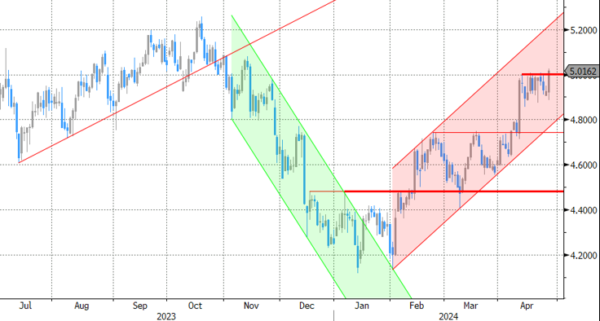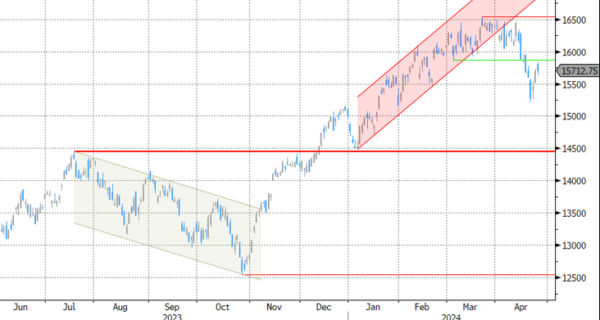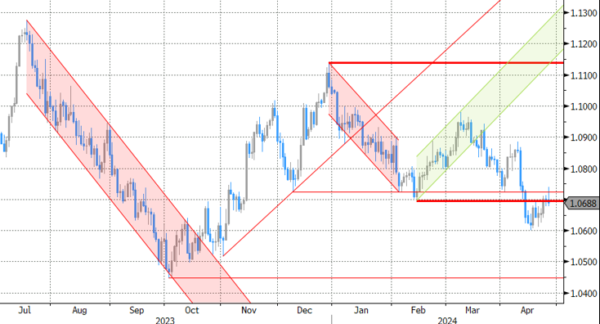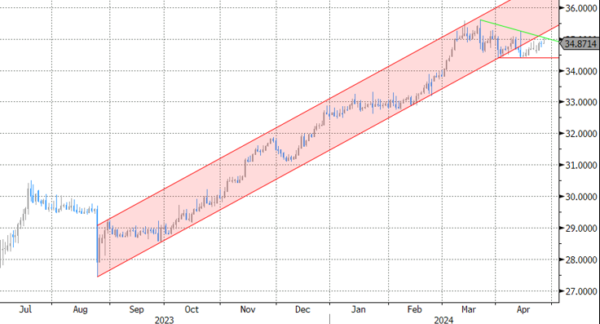Markets
Asian markets mostly started the day in risk-off modus after a disappointing outlook from tech bellwether Meta at its earnings report yesterday after the close of US markets. This also spilled over to European equities this morning. The risk-off again didn’t trigger any real safe haven bid for core bond markets. Declines in EMU yields were negligeable given recent rise. In line with recent other data evidence, German consumer confidence (GFK) also improved in April, (-24.2 from -27.3) supporting the idea of a services-driven recovery. US yields drifted cautiously higher going into the release of the first estimate of Q1 US GDP growth. The outcome was a bit confusing. US Q1 growth slowed 1.6% Q/Qa from 3.4% in Q4 2023 and 2.5% expected. However, domestic spending remained solid with personal consumption still growing 2.5% on solid demand for services (consumption growth on goods was slightly negative). Gross private investment (3.2%) and government consumption (1.2%) also added to growth. The downward surprise was mainly due to a negative contribution from inventories (-0.37% subtraction) and net exports (-0.86% subtraction). At least as important for markets as growth, price indicators again surprised to the upside. The global price index rose 3.1% from 1.6%. The core PCE deflator jumped from 2.0% to 3.7%! Yields briefly declined upon the release, but second reading soon made market realize that solid domestic demand and stubbornly high price indices won’t provide the Fed any comfort to start easing policy anytime soon. US yields currently add between 8 bps (2-y) and 6.0 bps (30-y). A low jobless claims figure (207k) only pointed in the same direction. The 2-y yield is topping the 5.0% mark. Markets are further scaling back expectations for two Fed rate cuts by the end of the year. A first 25 bps step is pushed back to November and a <50% chance is seen for an additional step in December. German yields follow the rise in the US at a distance, adding 3-5 bps across the curve and setting new YtD top levels. Higher (real) yields continue to put pressure on equity markets. The decline in EuroStoxx50 accelerated after the GDP release (-1.50%) US equities opened with losses of up to 2.0% (Nasdaq). The dollar gains, but rather modestly given the rise in US yields and the risk-off sentiment. DXY reversed an earlier intraday declined to again trade just below 106. EUR/USD slipped back below the 1.07 big figure (1.0680). USD/JPY is setting another multi-year top at 155.5 going into tomorrow’s BoJ policy decision. Sterling again slightly outperforms the euro despite CBI data showing a poor April retail sales performance. EUR/GBP is drifting further below the 0.86 (previous) support area (0.8575).
News & Views
The Turkish central bank (CBRT) kept its policy rate unchanged at 50% today after an unexpected 500 bps rate hike in March. The policy statement remains hawkish with a readiness to tighten further in case of a significant and persistent deterioration in inflation (expectations). For the time being though, the onus is watching how previous tightening with a lagged effect impacts credit conditions and domestic demand. The underlying trend in Turkish inflation was higher than expected in March with resilient domestic demand, the high level of and stickiness in services inflation, inflation expectations, pricing behavior, geopolitical risks and food prices all posing inflationary threats. The CBRT eventually hopes to bring inflation back to the 5% target over the medium term via monetary and financial conditions that bring around a moderation in domestic demand, a real appreciation of the Turkish lira and an improvement in inflation expectations. They hope to see green shoots in the disinflation process in the second half of this year. TRY isn’t impressed yet and holds near all-time lows at EUR/TRY 34.87.
French President Macron in a speech at the Sorbonne University in Paris called for an overhaul of EMU monetary policy. He suggested that inflation cannot be the sole target of the ECB and that there is need for a growth or decarbonization target as well. Macron blamed China and the US for over-subsidizing their companies and wants to double the EU’s budgetary capacity to ramp up public investment but also for defense. Macron argues that the EU can no longer rely on the US for its security. In order to achieve this, the French president wants to build a capital markets union in 12 months!
Graphs
US 2-y yield returns north of 5% as markets see ever lower probability of Fed rate cuts this year.
Nasdaq: Equities feeling headwinds from higher (real) yields
EUR/USD. Dollar rebounds (cautiously) as US economy shows solid domestic demand and sticky prices.
EUR/TRY: CBRT ‘tightening bias’ not enough to support the lira as EM currencies are under pressure globally.




